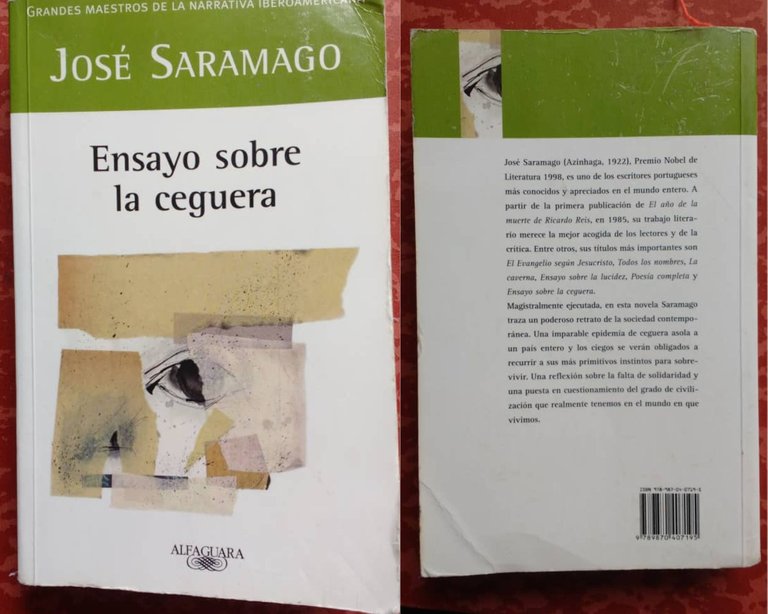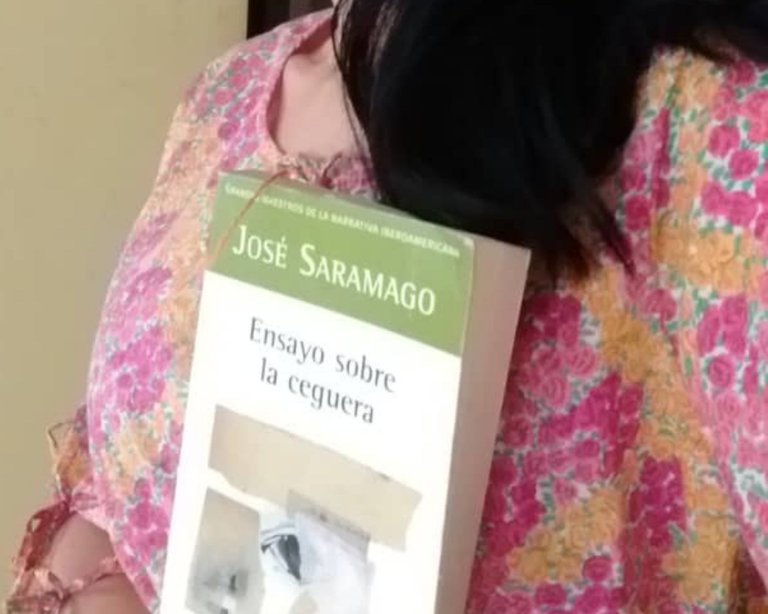In a lost city, in a country that looks so much like those we see drawn in Latin America, an epidemic began, but it was not just any epidemic, in essence people began to go blind, but not the darkness that blind people report, in this case, it was a milky white that veiled the sight of its inhabitants.

That is what the novel published in 1995, "Essay on Blindness" by José Saramago, a novelist of Portuguese origin who in 1998 was awarded the Nobel Prize for literature, is about. By the way, it is one of his best known novels and was even made into a movie with the title "A ciegas" (Blindfolded).
The book came into my hands from a friend, an avid reader like me. He was so impressed with the novel, that I didn't need to borrow it from him, because the same day, after finishing reading it, he gave it to me. He told me, "It won't take you more than a week to read it, I assure you. My friend was wrong, I did not read it in a week. I read it in 4 days, its 419 pages, that's how interesting I found it.
The novel tells the story of what would happen if suddenly all the inhabitants of a city were to go blind, first one, then another until one day all the inhabitants were behind a milky white curtain.

How would the authorities take control of the situation, since even they themselves are prone to become hopelessly blind. Who in such a situation would take control. Would there be order, would sanity take control of its inhabitants, or would the most basic instincts jump to achieve survival?
The novel tells how terror took over the city and the inhabitants who could still have the ability to see, had as their worst enemy the poor blind, who had to live in a world made to have eyes.
He also describes how the blind people used to satisfy their physiological needs such as bathing, eating, going to the bathroom to do number 1 and above all number 2 ... , how would they clean themselves? These are questions that the author captures in the book in a heartbreaking, almost frightening way.
But in his novel, Saramago goes further, drawing a primitive society with a total lack of solidarity, compassion and love for others. He shows how fragile we are as human beings and the thin line that separates reason from madness.
The characters are nameless, I think because in a world of the blind, people are known by the timbre of their voice. In the novel there is only one person immune to the epidemic, the ophthalmologist's wife, who at the beginning, her love for her husband, leads her to follow him wherever he is sent and pretend to be just another blind person.

As the novel unfolds, she grows compassionate towards other blind people who live in the same room where she is and suddenly becomes the center of many emotions and actions. She is the only one who can see all the horror in which they live and even has to make decisions that go beyond self-defense, taking the law into her own hands.
If you have the opportunity I invite you to read the book, it is a luxury read.
If you made it this far, thank you very much for reading, I hope you enjoyed the reading.

AHORA EN ESPAÑOL
En una ciudad pérdida, de un país que se parece tanto a esos que vemos dibujados en Latinoamérica, comenzó una epidemia, pero no era cualquier epidemia, en esencia las personas comenzaron a quedarse ciegas, pero no la oscuridad que la gente invidente relata, en este caso, era un blanco lechoso que velaba la vista de sus habitantes.

De eso se trata la novela publicada en 1995, “Ensayo sobre la ceguera” de José Saramago, novelista de origen portugués que en 1998 le fue otorgado el premio nobel de literatura. Por cierto es una de sus novelas más conocidas y hasta fue llevada al cine con el título “A ciegas”.
El libro llegó a mis manos por parte de un amigo, ávido lector al igual que yo. Quedó tan impactado con la novela, que no tuve necesidad de pedírsela prestada, pues el mismo día, luego de terminar su lectura, me la entregó. Me dijo, no vas a tardar más de una semana en leerla, eso te lo aseguro. Mi amigo se equivocó, no la leí en una semana. La leí en 4 días sus 419 páginas, así de interesante me pareció.
La novela relata lo que pasaría si de pronto todos los habitantes de una ciudad, se quedaran ciegos, primero uno, luego otro hasta que un día todos sus habitantes quedaran tras una cortina blanco lechoso.

Cómo las autoridades tomarían el control de la situación, pues hasta ellos mismos están propensos a quedar irremediablemente ciegos. Quién en una situación como esa tomaría el control. Habría un orden?, la sensatez tomaría el control de sus habitantes? o más bien saltarían los más básicos instintos para lograr la supervivencia?
La novela relata como el terror se apoderó de la ciudad y los habitantes que aún podían tener la capacidad de la visión, tenían como a su peor enemigo a los pobres ciegos, a quienes les tocó vivir en un mundo hecho para tener ojos.
También describe cómo los ciegos hacían para satisfacer necesidades fisiológicas como bañarse, comer, ir al baño a hacer el número 1 y sobre todo el número 2 … , como se limpiarían? Son cuestiones que el autor plasma en el libro de una forma desgarradora, casi aterradora.
Pero en su novela, Saramago va más allá, dibujando una sociedad primitiva con total falta de solidaridad, compasión y amor por el prójimo. Muestra los frágiles que somos como seres humanos y la delgada línea que separa la razón de la locura.
Los personajes carecen de nombre, creo que porque en un mundo de ciegos, la gente se conoce por el timbre de su voz. En la novela solo hay una persona inmune a la epidemia, la esposa del oftalmólogo, quien al principio, el amor por su esposo, la lleva a seguirlo a donde lo envían y hacerse pasar por una ciega más.

En el desarrollo de la novela, en ella crece la compasión hacia otros ciegos que viven en la misma sala donde está y de pronto se convierte en el centro de muchas emociones y acciones. Es la única que puede ver todo el horror en el que viven y hasta tiene que tomar decisiones que van más allá de la defensa personal, tomando la ley en sus manos.
Si tienes la oportunidad te invito a leer el libro, no tiene desperdicio, todo un lujo de lectura.
Si llegaste hasta aquí, muchas gracias por leerme, espero haya sido de agrado la lectura.

Hi tibaire,
Visit curiehive.com or join the Curie Discord community to learn more.
Thanks You so much
The rewards earned on this comment will go directly to the person sharing the post on Twitter as long as they are registered with @poshtoken.
Me parece interesantisimo, me gustó tu reseña sin duda lo agregaré a la lista. Supongo habrán quienes se aprovecharían de la situación de ceguera, robos, violaciones, desgracias... Y sin duda que debe estar muy bien relatado por tan gran escritor. Saludos y gracias por compartir.
Hola @cibersk8 todo lo que acabas de escribir está plasmado en el libro, hubo de todo lo dices y más! Llegó un momento que me creo cierta ansiedad, desde mi punto de vista romántico me niego a ver una sociedad tan deprimente, pero el cuenta una historia que nos hace reflexionar. Cuando puedas léelo!
Human beings, especially when they are people who have high self-esteem, tend to maintain an indifferent attitude to what happens around them, but they tend to lose that confidence and esteem in themselves when they also lose something as valuable as their sight. That is when they begin to develop the empathy that we show when we can understand and put ourselves in the shoes of others, which allows us to help each other to achieve a better life. Thank you very much for such a beautiful and meaningful review, which undoubtedly leaves us a lesson that cannot be ignored @tibaire
Hello @ava2702, thank You so much for reading me. You are right human beings we so egoíst. But when somethings happens in our lifes we change yo be more empatic with others. The book is awesome!!!
Exactly, we never know the twists and turns of life, so it's best to mostly try not to judge others, instead, to be more generous and kind. I have no doubt that the book is wonderful, again thanks for your review @tibaire